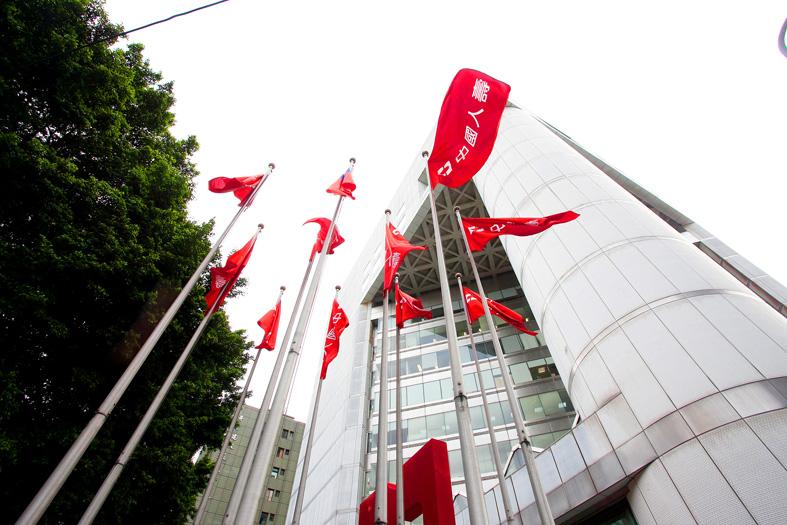China Development Financial Holding Co (中華開發金控) on Thursday said that it is seeking to complete the takeover of China Life Insurance Co (中國人壽) by the end of this year by acquiring all remaining shares of the firm via a share swap.
The companies’ boards of directors approved the proposed share swap, in which one common share of China Life would be exchanged for 0.8 common shares of China Development, plus 0.73 preferred shares of China Development and a cash bonus of NT$11.5 per share, they said.
China Development would issue 2.07 billion new common shares and 1.89 billion new preferred shares that would be exchanged for China Life’s common shares, they said.

Photo courtesy of China Life Insurance Co
China Development said it would consider several options, including issuing corporate bonds, to fund the deal.
Through two tender offers completed in September 2017 and in February this year, China Development boosted its stake in China Life to 55.95 percent.
The company expects to complete the acquisition of the remaining 44.05 percent in the life insurer, if shareholders approve the deal in a meeting on Oct. 1, it said.
“The takeover, although including the issuance of new shares, would not necessarily weaken our earnings per share, as it would give us full ownership of China Life and allow us to benefit from the insurer’s profit, which should contribute a lot,” China Development spokesman Richard Chang (張立荃) told the Taipei Times by telephone on Friday.
Based on China Life’s closing share price of NT$26.9 and China Development’s share price of NT$13.85 on Thursday, China Development has offered a premium of 17.3 percent for China Life shares, Chang said.
The deal is unusual as China Development would not only immediately offer cash to China Life’s shareholders, but also give them access to its own preferred shares with an annual dividend yield of 3.55 percent, he said.
After fully acquiring China Life, China Development would seek to strengthen its insurance operations, as well as its banking and securities businesses, the company said, adding that it would boost its overall growth.
China Development said that it would intensify efforts to accelerate the integration of its three major businesses — banking, insurance and securities.
Both companies plan to swap shares by the end of this year, pending Financial Supervisory Commission approval, Chang said.
China Life would be delisted from the Taiwan Stock Exchange after the acquisition, Chang said.
Additional reporting by CNA

Zhang Yazhou was sitting in the passenger seat of her Tesla Model 3 when she said she heard her father’s panicked voice: The brakes do not work. Approaching a red light, her father swerved around two cars before plowing into a sport utility vehicle and a sedan, and crashing into a large concrete barrier. Stunned, Zhang gazed at the deflating airbag in front of her. She could never have imagined what was to come: Tesla Inc sued her for defamation for complaining publicly about the vehicles brakes — and won. A Chinese court ordered Zhang to pay more than US$23,000 in

Taiwan Semiconductor Manufacturing Co (TSMC, 台積電) yesterday held its first board of directors meeting in the US, at which it did not unveil any new US investments despite mounting tariff threats from US President Donald Trump. Trump has threatened to impose 100 percent tariffs on Taiwan-made chips, prompting market speculation that TSMC might consider boosting its chip capacity in the US or ramping up production of advanced chips such as those using a 2-nanometer technology process at its Arizona fabs ahead of schedule. Speculation also swirled that the chipmaker might consider building its own advanced packaging capacity in the US as part

‘NO DISRUPTION’: A US trade association said that it was ready to work with the US administration to streamline the program’s requirements and achieve shared goals The White House is seeking to renegotiate US CHIPS and Science Act awards and has signaled delays to some upcoming semiconductor disbursements, two sources familiar with the matter told reporters. The people, along with a third source, said that the new US administration is reviewing the projects awarded under the 2022 law, meant to boost US domestic semiconductor output with US$39 billion in subsidies. Washington plans to renegotiate some of the deals after assessing and changing current requirements, the sources said. The extent of the possible changes and how they would affect agreements already finalized was not immediately clear. It was not known

Taiwan Semiconductor Manufacturing Co (TSMC, 台積電) yesterday said that its investment plan in Arizona is going according to schedule, following a local media report claiming that the company is planning to break ground on its third wafer fab in the US in June. In a statement, TSMC said it does not comment on market speculation, but that its investments in Arizona are proceeding well. TSMC is investing more than US$65 billion in Arizona to build three advanced wafer fabs. The first one has started production using the 4-nanometer (nm) process, while the second one would start mass production using the